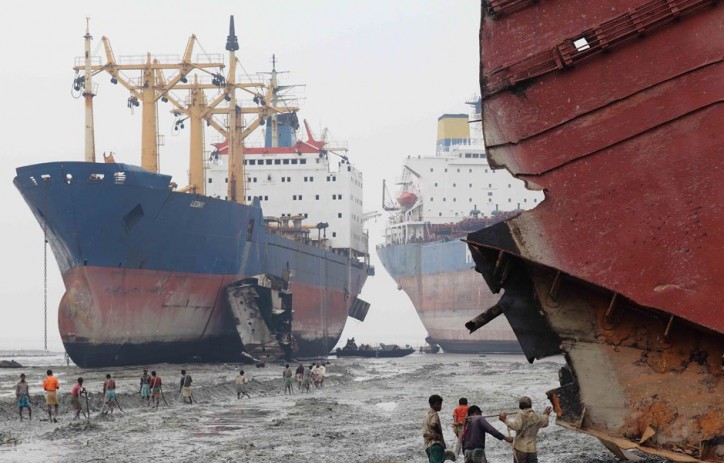According to the NGO Shipbreaking Platform’s 6th South Asia Quarterly Update, a spate of recent deaths is indication enough for it to be determined that there is still a major issue regarding lack of safety equipment usage among the industry.
The report provides a shipbreaking active overview regarding India, Bangladesh and Pakistan, and covers the impact of shipbreaking practices that aren’t in compliance with the appointed standards. It also reveals the fact that six Bangladeshi workers lost their lives during 2015’s Q2 and a few others were injured. Five of the said deaths occurred in July.
The NGO points to the conclusion that Bangladesh-based yards do not provide their workers with the required safety equipment, as the case with a 40-year-old worker who fell to his death due to the fact that he was not wearing a safety harness. Citing another case, a 15-year-old boy sustained severe injuries while working at ATL Group’s shipyard when a steel plate fell and crushed his leg. The owner of the yard subsequently refused to cover his treatment expenses.
It is also worth noting that it is illegal to employ any young workers for the purposes of hazardous industries like shipbreaking, according to the labor laws of Bangladesh. The report points out that despite the frequent occurrence of accidents such as the two mentioned above, there have been no efforts made to prevent issues of this type. Ferdous and Ziri Subedar are among the shipyards mentioned along the lines of the report.
There are some positive developments underway, however, in several scrapping facilities.
Maria Bruun Skipper, the Danish Shipowners' Association (DR)’s Director recently made a visit at India’s Alang Beach yard where more than 40% of the world’s vessels are usually dismantled. It has also been under heavy international criticism on a regular basis due to a severe lack of safety and almost non-existing environmental consideration.

Photo: IMO
Skipper made visits to 4 out of the total 175 scrapping facilities located in the area. Among her final conclusions was the fact that several of the Alang Beach –based scrapping facilities have made some progress towards complying with the requirements that are going to be stipulated by the forthcoming Hong Kong Convention.
India made the Ship Recycling Code effective back in the year 2013. It calls for measures towards a better working environment and a more eco-friendly approach to the whole process of the yards, especially when it comes to dealing with sampling of water and soil, hazardous waste, health care and training of workers.
“We were able to note that workers wore safety equipment and had six-monthly route medical examinations, among other things,” comments Skipper.
2015’s Q2 accounted for a total of 213 large commercial vessels being sold for the purposes of dismantling, including 136 end-of-life vessels, which were beached in South Asia primarily in India’s Mumbai and Alang (53 vessels), Bangladesh’s Chittagong (47) and in Pakistan’s Gadani (37).